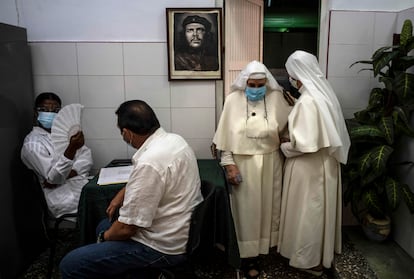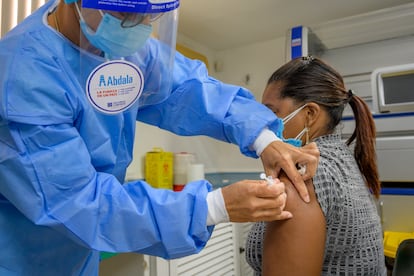Cuba announces its Abdala vaccine is 92.28% effective against Covid-19
A second medication called Soberana 02 also showed an efficacy rate of 62%, according to the results of the Phase 2 trial

Cuba has announced that a vaccine it developed is 92.28% effective against Covid-19 after three doses, on par with the effectiveness of the Pfizer-BioNTech and Moderna medications. These were the first result of the Phase 3 trial which involved 48,000 volunteers.
The Abdala vaccine developed by Cuba’s Center for Genetic Engineering (CIGB) is one of five vaccine candidates being trialed on the island. A second Phase 3 trial of another vaccine, dubbed Soberana (or Sovereign) 02, showed an efficacy rate of 62% with two doses, though a third will be administered to volunteers to check whether this rises further.
“This is excellent news and fills us with optimism in the region, where there is still a great deficit of vaccines,” said José Moya, who represents the World Health Organization (WHO) and the Pan American Health Organization (PAHO) in Cuba. Moya, who has closely followed the development of the Cuban formulas, said the Cuban state medicine regulator CECMED would soon approve the emergency use of Soberana 02 and Abdala, which is named after a poem by Cuban leader José Martí. The two vaccines, however, are already being administered on the island as part of an “intervention study in populations and territories at high risk” of Covid-19, said Moya. As of June 19, 2,244,336 people in Cuba had received at least one dose of the country’s vaccine candidates, the equivalent of 19.9% of the population.
Cuba’s health authorities aim to have 70% of the island’s inhabitants vaccinated by September, and 100% by the end of the year. When the trial data are published, Cuba will be able to apply to the WHO for prequalification and validation of its vaccines, a procedure that requires rigorous scientific review over several months. “The WHO carries out a very thorough process for vaccine candidates that have concluded Phase 3 trials, have produced efficacy results and have been authorized by the national regulator. If all goes well, the Cuban vaccines will be able to join the eight already prequalified in the world before the end of the year,” Moya added.
Cuba is currently working on no less than five Covid-19 vaccine candidates. Soberana 01, Soberana 02 and Soberana Plus are being developed by the Finlay Institute of Vaccines (IFV), while Abdala and Mambisa were created by the CIGB. The Mambisa vaccine is administered via a nasal spray.

“Hit by the pandemic, our scientists at the Finlay Institute and Center for Genetic Engineering and Biotechnology have risen above all the obstacles and given us two very effective vaccines,” Cuban President Miguel Diaz-Canel said in a message on Twitter.
All the Cuban prototypes are so-called protein subunit vaccines, which are based on injecting inoculated fragments of the virus’s spike protein to produce an immune response. The fragments used in the Abdala and Mambisa vaccine are developed in yeast, while the IFV vaccines are developed in mammal cells.
Cuba has more than 30 years of experience in producing vaccines, with 80% of those used in its national vaccination schemes developed by the country itself. Cuba’s Hepatitis-B and meningitis vaccines are widely used in Latin America and other countries worldwide with the backing of the WHO. According to Moya, the “solidity” of the Cuban regulator CECMED is a guarantee that Cuban vaccines against Covid-19 will be of good quality, as it is considered a center of reference and one of the best in the region.
With CECMED’s approval, Cuba could start drawing up a vaccine export plan within a week, before the WHO gives the go-ahead. “Countries have autonomy to make bilateral agreements. If there is a country interested in acquiring Cuban vaccines, the PAHO and the WHO do not participate because those are direct agreements,” said Moya. “At the WHO there is a procedure to follow, and once the vaccines are approved in Cuba the next step is to publish the data in scientific journals and ask for prequalification. If WHO approves it, the Cuban vaccines could be part of those distributed by Covax [the global initiative aimed at guaranteed equitable access to vaccines] or by PAHO’s Revolving Fund [a cooperation mechanism for 30 member states].”
Moya said the announcement was “excellent news for Cuba, but also a reason for hope for the region,” where there is a vaccine shortage. PAHO’s director, Carissa Etienne, has urged countries that have the capacity to produce vaccines, such as Mexico, Argentina, Brazil and Cuba, “to work together, coordinate efforts, participate in sharing technology, putting solidarity and Pan-Americanism first.”
The Cuban announcement comes amid a serious economic crisis, with the country currently lacking even the most basic medicines, such as antibiotics. The island has staked everything on its own vaccines, and did not participate in the WHO’s Covax consortium, nor did it buy any vaccines on the international market. Cuba is currently experiencing its third and worst outbreak of the coronavirus pandemic, with record numbers of infected people. It has registered a total of 174,789 cases and more than 1,600 deaths since the pandemic began.
Tu suscripción se está usando en otro dispositivo
¿Quieres añadir otro usuario a tu suscripción?
Si continúas leyendo en este dispositivo, no se podrá leer en el otro.
FlechaTu suscripción se está usando en otro dispositivo y solo puedes acceder a EL PAÍS desde un dispositivo a la vez.
Si quieres compartir tu cuenta, cambia tu suscripción a la modalidad Premium, así podrás añadir otro usuario. Cada uno accederá con su propia cuenta de email, lo que os permitirá personalizar vuestra experiencia en EL PAÍS.
¿Tienes una suscripción de empresa? Accede aquí para contratar más cuentas.
En el caso de no saber quién está usando tu cuenta, te recomendamos cambiar tu contraseña aquí.
Si decides continuar compartiendo tu cuenta, este mensaje se mostrará en tu dispositivo y en el de la otra persona que está usando tu cuenta de forma indefinida, afectando a tu experiencia de lectura. Puedes consultar aquí los términos y condiciones de la suscripción digital.








































